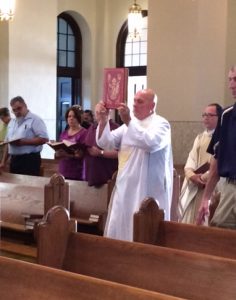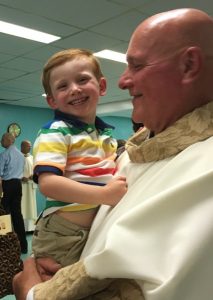Leo Barron had no intention of becoming a deacon, but God had other plans.
Deacon Barron, who is also a Companion (lay associate of the Missionaries of the Precious Blood) with the group in Whiting, Ind., went into the lay ecclesial ministry program (LEMP) with the Diocese of Gary, Ind., in 2010. He was planning to retire from the Boys & Girls Clubs of America after 42 years of service, and he hoped the LEMP would help him explore volunteer opportunities within the Church and his parish, St. John the Baptist in Whiting, Ind.
“I thought it would give me some ideas,” he said.
It certainly gave other people some ideas. “I was four weeks into my first class (in the LEMP), and I was at church before Mass when our deacon saw me. ‘I hear you’re going to be a deacon!’ he said. I hadn’t even thought of that,” Deacon Barron said.
What that deacon may have started, God nudged along—and on June 10, at Holy Angels Cathedral in Gary, Deacon Barron was ordained by Bishop Donald Hying.
It had been a long journey. There was the four years of the LEMP, during which time he decided to apply for the diaconate program, then two years of waiting for enough men to form a cohort—the diocese requires at least six diaconal candidates. Then there were two more years of study and formation for the diaconate.
Throughout much of that time, though he was hearing the call, he didn’t say yes right away. “I’d spent five of my six years of study trying to come up with reasons why I shouldn’t be there,” he said. “Every time I thought of a good reason, it got shot down. I guess our God is a persistent God.”
Reasons not to be a deacon included his age: 11 years older than the next-oldest man in his group, Deacon Barron was 71 when ordained, “the time I could become a senior deacon.”
 Another reason was that “I’ve never considered myself a holy person. But when I mentioned those concerns, somebody always had an answer, usually: ‘God chooses the people he chooses for his own reasons. Plenty of people have been called; it’s God’s decision, not yours.’ Finally, during the second year of the diaconate program, it was getting serious. So I thought about it, and I said to the Lord, ‘Well, if you want me to do this, I will do it.’”
Another reason was that “I’ve never considered myself a holy person. But when I mentioned those concerns, somebody always had an answer, usually: ‘God chooses the people he chooses for his own reasons. Plenty of people have been called; it’s God’s decision, not yours.’ Finally, during the second year of the diaconate program, it was getting serious. So I thought about it, and I said to the Lord, ‘Well, if you want me to do this, I will do it.’”
Deacon Barron said he has been stretched by the ministry he took on as part of his formation. He volunteers at St. Catherine Hospital in East Chicago, Ind., where he brings communion to patients on Wednesdays.
“I chose that ministry because I am uncomfortable with it and I need to grow,” he said. “When I was working at the Boys & Girls Clubs, I was always a hands-on person, the one who said, ‘Let’s get moving.’ If there was a problem, I’d sit down with the individual so that we could make a plan, and I could guide him or her toward a solution. But when you walk into a hospital room, you don’t know what you’re going to encounter. You feel humbled. Physically, there’s nothing you can do for the individual who is there. I’ve had to learn that it’s just my presence, opening myself up to them, that might help them. It’s the hope that they can see the presence of God through me.”
As a deacon, he’ll take on new ministries, in collaboration with Fr. Mark Peres, C.PP.S., the pastor of St. John the Baptist and other parishes in its cluster. Deacon Barron knows he will be preaching, probably beginning in the fall, and looks forward to it.
He also hopes to advance social justice issues in the parish, something that’s long been a priority for him. He volunteers with the St. Vincent de Paul Society and the Whiting food pantry.
And he has a special mission: “I’ve always been aware that when you look out at everybody during Mass, you see some people who almost have a halo above their heads. There are others who are there just because that’s what you do on Sunday. I want to tell them, ‘There’s so much more that God has to offer you’—and those are the ones I hope I can reach.”
Certainly, Deacon Barron learned that God has much more to offer him, through his parish; through his family, including his wife, Cynthia, three grown children and three grandchildren, who supported him throughout the journey; and through being a Companion.
“In terms of my spiritual growth, being a Companion has made a world of difference to me,” he said. “I’ve gotten so much from the people in our group.”
